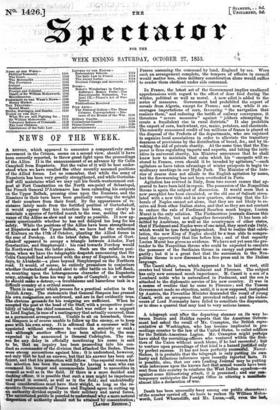NEWS OF THE WEEK.
A REPORT, which appeared to announce a comparatively small
movement in the Crimea, seems on a second view, should it have been correctly reported, to throw great light upon the proceeding'
of the Allies. It is the announcement of an advance by Sir Cohn Campbell from Eupatoria. But the value of it will be best under- stood when we have recalled the other recently assumed positions of the Allied forces. Let us remember, that while the army of Eupatoria has been very greatly strengthened, and while Gortscha- koff still maintains what we may call his South-westernmost out-
post at Fort Constantine on the North sea-point of Sebastopol, the French General D'Autemarre has been extending his outposts on the Upper Belbek, pressing close upon the Russians, and the Russians in their turn have been gradually removing the weight of their numbers from their front. By the appearances of re- sistance lately made from the fortified position of Gortschakolf, it would appear that his intention has been, very slowly to maintain a species of fortified march to the rear, making the ad- vance of the Allies as slow and as costly as possible. It now ap- pears questionable whether he has not delayed too long for his safety. While the positions of the Allies have been strengthened at Eupatoria and the Upper Belbek, we have had the reduction of Kinburn on the 17th of October, planting the Allied forces in the rear of Perekop. At the latest dates, the position of Gort- schakoff appeared to occupy a triangle between Aitodor, Fort Constantine, and Simpheropol : his road towards Perekop would lie Northward from the latter place. Such are the relative posi- tions, when we have the telegraphic despatch announcing that Sir Colin Campbell had advanced with the army of Eupatoria, in two days, to Aktatschi—a place beyond Simpheropol on the Northern road. It would, of course, be entirely premature to conjecture whether Gortschakoff should elect to offer battle on his left flank, or, counting upon the heterogeneous character of the Eupatoria army, attempt to force his way in spite of Campbell ; or whether he should make a detour,—a troublesome and hazardous task in a difficult country at a critical season.
There is one point which presses for a practical solution in the British Army. The statements that General Simpson has pressed his own resignation are confirmed, and are in fact evidently true. The obvious grounds for his resigning are sufficient. When he accepted the post at the head of the Staff, with a prospective possi- bility of taking the chief command, that was rather as a support to Lord Raglan, in case of a contingency that actually occurred, than as a permanent arrangement. Unable to sit on horseback, Gene- ral Simpson is of course unable to follow up the enemy, or to keep pace with his own army. It is affirmed that a successor will be appointed without reference to routine in seniority or rank ; and although another officer has been alluded to, the man expected to be announced is General Codrington. The rea- son for any delay in officially mentioning his name is said to be, that an inquiry has been proceeding into his con- duct as commander of the division that attacked the Redan. There were strong accusations against him ; it is understood, however, not only that he had an answer, but that his answer has been suf- ficient, and that his promotion will follow. One especial reason for the selection has been the necessity for having a man who can command his temper and accommodate himself to necessities in council as well as in the field. If there is a more decided and dashing officer, it is possible that such a man might be impetuous and proud in council, as well as in the field; and undoubtedly these. considerations must have their weight, so long as the re- spective Governments of France and England agree in cutting up an authority divided equally in their military and naval forces. The uninitiated public is puzzled to understand why a more natural disposition of authority should not be attained by concentration;
France assuming the command by land, England by sea. Were such an arrangement complete, the tempers of officers in council would matter less since military consideration alone would sake to render them obedient under sole command.


























